pep小学英语六年级毕业总复习资料
PEP小学英语六年级毕业升学考试总复习
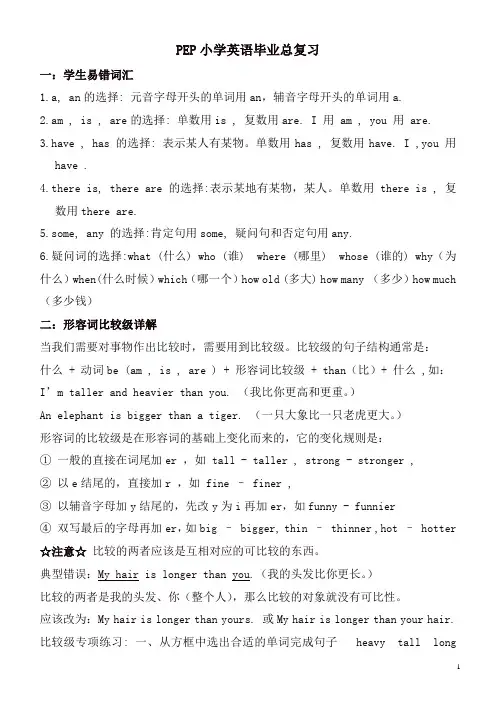
PEP小学英语毕业总复习一:学生易错词汇1.a, an的选择: 元音字母开头的单词用an,辅音字母开头的单词用a.2.am , is , are的选择: 单数用is , 复数用are. I 用 am , you 用 are.3.have , has 的选择: 表示某人有某物。
单数用has , 复数用have. I ,you 用have .4.there is, there are 的选择:表示某地有某物,某人。
单数用there is , 复数用there are.5.some, any 的选择:肯定句用some, 疑问句和否定句用any.6.疑问词的选择:what (什么) who (谁) where (哪里) whose (谁的) why(为什么)when(什么时候)which(哪一个)how old (多大) how many (多少)how much (多少钱)二:形容词比较级详解当我们需要对事物作出比较时,需要用到比较级。
比较级的句子结构通常是:什么 + 动词be (am , is , are ) + 形容词比较级 + than(比)+ 什么 ,如:I’m taller and heavier than you. (我比你更高和更重。
)An elephant is bigger than a tiger. (一只大象比一只老虎更大。
)形容词的比较级是在形容词的基础上变化而来的,它的变化规则是:①一般的直接在词尾加er ,如 tall - taller , strong - stronger ,②以e结尾的,直接加r ,如 fine – finer ,③以辅音字母加y结尾的,先改y为i再加er,如funny - funnier④双写最后的字母再加er,如big – bigger, thin – thinner ,hot – hotter ☆注意☆比较的两者应该是互相对应的可比较的东西。
典型错误:My hair is longer than you.(我的头发比你更长。
PEP人教版小学六年级毕业班英语复习资料(三至六年级)
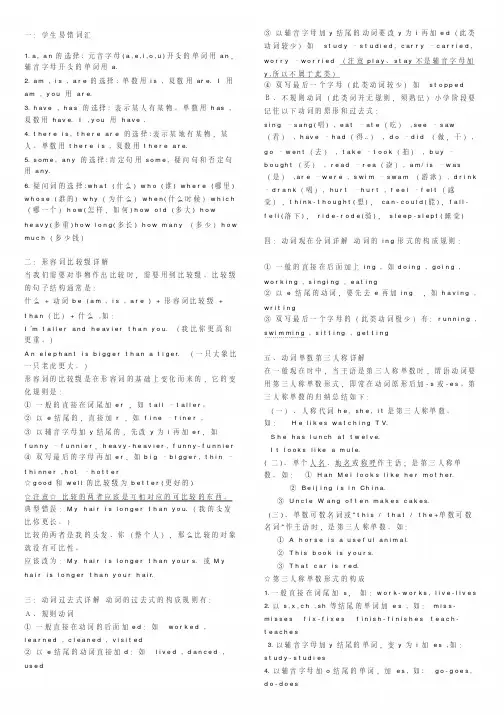
一:学生易错词汇1.a,a n的选择:元音字母(a,e,i,o,u)开头的单词用a n,辅音字母开头的单词用 a.2.a m,i s,a r e的选择:单数用i s,复数用ar e.I用a m,y o u用a r e.3.h a v e,h a s的选择:表示某人有某物。
单数用h as,复数用h a v e.I,y ou用h a v e .4.t h e r e i s,t h e r e a r e的选择:表示某地有某物,某人。
单数用t h e r e i s,复数用t h e r e a r e.5.s o m e,a n y的选择:肯定句用s o m e,疑问句和否定句用a n y.6.疑问词的选择:w h a t(什么)w h o(谁)w h e r e(哪里) w h o s e(谁的)w h y(为什么)w h e n(什么时候)w h i c h (哪一个)h o w(怎样,如何)h o w o l d(多大)h o wh e a v y(多重)h o w l o n g(多长)h o w m a n y(多少)h o w m u c h(多少钱)二:形容词比较级详解当我们需要对事物作出比较时,需要用到比较级。
比较级的句子结构通常是:什么+动词b e(a m,i s,a r e)+形容词比较级+t h a n(比)+什么,如:I’m t a l l e r a n d h e av i e r t h a n y o u.(我比你更高和更重。
)A n e l e p h an t i s b i g g e r t h a n a t i g e r.(一只大象比一只老虎更大。
)形容词的比较级是在形容词的基础上变化而来的,它的变化规则是:①一般的直接在词尾加e r,如t a l l–t a l l e r。
②以e结尾的,直接加r,如f i n e–f i n e r,③以辅音字母加y结尾的,先改y为i再加e r,如f u n n y–f u n n i e r,h e a v y-h e a v i e r,f u n n y-f u n n i e r④双写最后的字母再加e r,如b i g–b i g g e r,t h i n–t h i n n e r,h o t–h o t t e r☆g o o d和w e l l的比较级为b e t t e r(更好的)☆注意☆比较的两者应该是互相对应的可比较的东西。
小学PEP英语毕业总复习之各册知识点
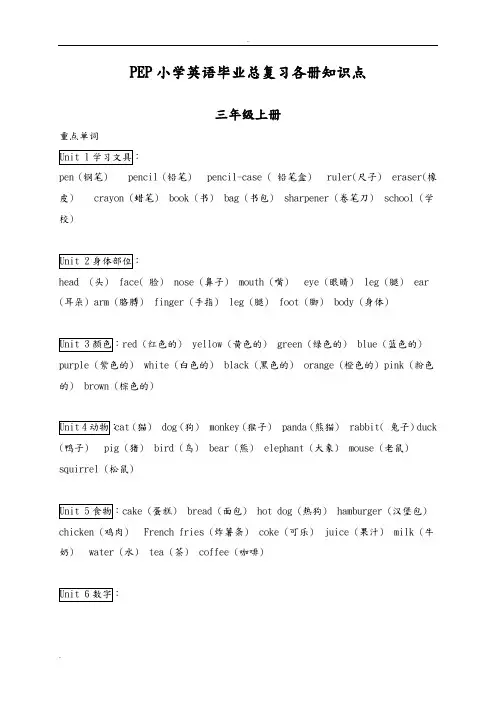
PEP小学英语毕业总复习各册知识点三年级上册重点单词pen (钢笔) pencil (铅笔) pencil-case ( 铅笔盒) ruler(尺子) eraser(橡皮) crayon (蜡笔) book (书) bag (书包) sharpener (卷笔刀) school (学校)head (头) face( 脸) nose (鼻子) mouth (嘴) eye (眼睛) leg (腿) ear (耳朵) arm (胳膊) finger (手指) leg (腿) foot (脚) body (身体)red (红色的) yellow (黄色的) green (绿色的) blue (蓝色的) purple (紫色的) white (白色的) black (黑色的) orange (橙色的) pink (粉色的) brown (棕色的)cat (猫) dog (狗) monkey (猴子) panda (熊猫) rabbit( 兔子) duck (鸭子) pig (猪) bird (鸟) bear (熊) elephant (大象) mouse (老鼠) squirrel (松鼠)cake (蛋糕) bread (面包) hot dog (热狗) hamburger (汉堡包) chicken (鸡肉) French fries (炸薯条) coke (可乐) juice (果汁) milk (牛奶) water (水) tea (茶) coffee (咖啡)one (一) two (二) three (三) four (四) five (五) six( 六) seven (七) eight (八) nine( 九) ten( 十) doll (玩具娃娃) boat (小船) ball (球) kite (风筝) balloon (气球) car (小汽车) plane (飞机)重点句型1、向别人问好应该说――A: Hello! (你好!)B: Hi! (你好!)2、问别人的名字应该说-―A:What’s your nam e?你的名字是什么?B:My name’s Chen Jie. 我的名字是洁。
小学六年级英语毕业考试综合复习题及听力稿答案、六上英语期末卷
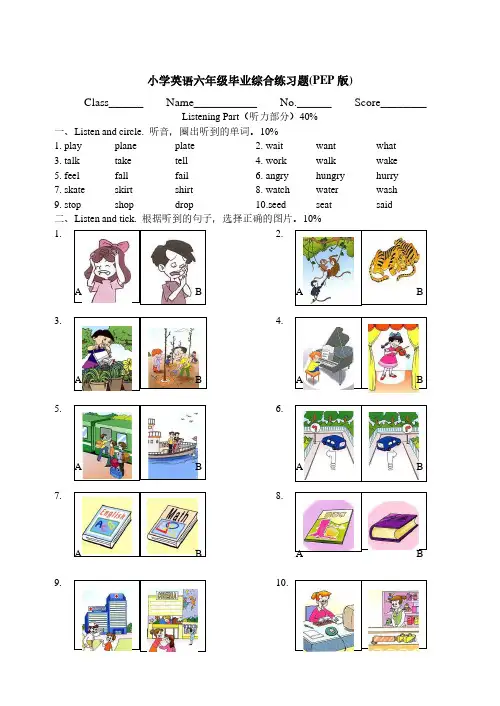
小学英语六年级毕业综合练习题(PEP版)Class______ Name___________ No.______ Score________Listening Part(听力部分)40%一、Listen and circle. 听音,圈出听到的单词。
10%1. play plane plate2. wait want what3. talk take tell4. work walk wake5. feel fall fail6. angry hungry hurry7. skate skirt shirt 8. watch water wash9. stop shop drop 10.seed seat said二、Listen and tick. 根据听到的句子,选择正确的图片。
10%1. 2.A B A B3. 4.A B A B5. 6.A B A B7. 8.A B A B9. 10.A B A B三、Listen and choose. 听问句,选择正确的答句。
10%( )1. A. I’m 40kg. B. I’m 154cm. C. I’m 12.( )2. A. She’s fine. B. He has a cold. C. He feels happy. ( )3. A. ct. 1st . B. June 1st. C. Jan. 1st.( )4. A. I’m going to Hong ong. B. I’m going there by plane.C. I’m going to buy a book.( )5. A. She likes watching TV. B. She watches TV every evening.C. She is a TV reporter.四、Listen and match. 听短文,连线。
10%ei ei Y unnanLiu i NingboLi Ping Hangzhouheng Jing Harbinu Yifan Shanghairiting Part(笔试部分)60%五、riting(正确抄写句子,并圈出其中的元音字母)5%LET US G SA TING六、Read and arrange.将下列人名按照英汉字典中的先后顺序标号。
pep小学英语六年级复习资料
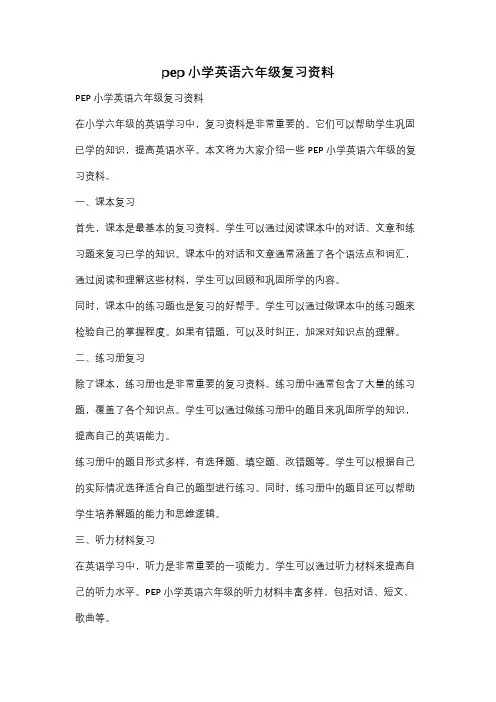
pep小学英语六年级复习资料PEP小学英语六年级复习资料在小学六年级的英语学习中,复习资料是非常重要的。
它们可以帮助学生巩固已学的知识,提高英语水平。
本文将为大家介绍一些PEP小学英语六年级的复习资料。
一、课本复习首先,课本是最基本的复习资料。
学生可以通过阅读课本中的对话、文章和练习题来复习已学的知识。
课本中的对话和文章通常涵盖了各个语法点和词汇,通过阅读和理解这些材料,学生可以回顾和巩固所学的内容。
同时,课本中的练习题也是复习的好帮手。
学生可以通过做课本中的练习题来检验自己的掌握程度。
如果有错题,可以及时纠正,加深对知识点的理解。
二、练习册复习除了课本,练习册也是非常重要的复习资料。
练习册中通常包含了大量的练习题,覆盖了各个知识点。
学生可以通过做练习册中的题目来巩固所学的知识,提高自己的英语能力。
练习册中的题目形式多样,有选择题、填空题、改错题等。
学生可以根据自己的实际情况选择适合自己的题型进行练习。
同时,练习册中的题目还可以帮助学生培养解题的能力和思维逻辑。
三、听力材料复习在英语学习中,听力是非常重要的一项能力。
学生可以通过听力材料来提高自己的听力水平。
PEP小学英语六年级的听力材料丰富多样,包括对话、短文、歌曲等。
学生可以通过听力材料来提高自己的听力理解能力,并加深对词汇和语法的理解。
同时,通过反复听同一段材料,学生还可以提高自己的听力准确性和速度。
四、口语练习在英语学习中,口语是非常重要的一项能力。
学生可以通过口语练习来提高自己的口语表达能力。
可以和同学或老师进行对话练习,或者参加英语角等活动。
在口语练习中,学生可以运用已学的知识,进行日常对话练习。
通过反复练习,学生可以提高自己的口语流利度和准确性。
五、网络资源除了以上介绍的复习资料,网络资源也是学生复习的好帮手。
学生可以通过搜索引擎找到大量的英语学习网站和应用程序。
这些网站和应用程序中通常包含了大量的学习资源,如词汇表、语法讲解、练习题等。
最新人教pep版小学英语毕业课本知识点单元复习第24课时六年级上册 Unit 6
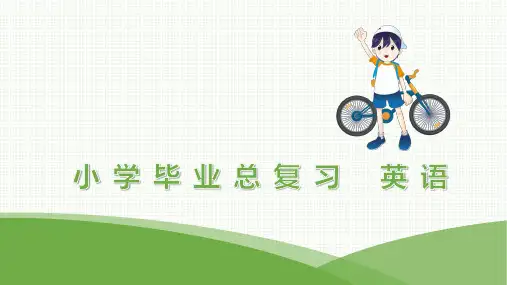
三、Ask and answer. 根据上下文,写出问句,使对话合理、 通顺并符合逻辑。 1. A: You look so sad. ___W__h_y_?__/W__h_y__a_r_e_y_o_u__sa_d__?__/W__h_y__d_o_y_o_u____
____f_e_e_l_s_a_d_?__/W__h_a_t_'_s_w_r_o_n_g__(_w_i_th__y_o_u_)_?__________________ B: I can't find my mother. I am lost (迷路). 2. A: Peter is angry. __W__h_a_t__sh_o_u__ld__h_e_d_o_?__________ B: He should take a deep breath and count to ten.
13. count 数数
பைடு நூலகம்
返回目录
重 1. They're afraid of him. 它们害怕它。 点 2. The cat is angry with them. 这只猫很生它们的气。 句 3. A: What's wrong? 怎么了? 子 B: Your father is ill. 你爸爸病了。
B: Yes, he feels very worried. 5. A: ___H_o_w__d_o_e_s_S__a_m__fe_e_l_?__/H__o_w__is__S_a_m_?________
B: Sam is so sad, because his mother is ill.
返回目录
四、Read and judge. 阅读短文,判断下列句子与短文内容 是否相符,相符的在括号内写“T”,不相符的写“F”。
PEP人教版小学英语六年级下册期末复习课件(全册)
更小的 __s_m_a_l_l_er__ 12岁_1_2__y_e_a_r_s_o_ld__ 多重__h_o_w__h_e_a_v_y__
更强壮的__st_r_o_n_g_e_r 多高__h_o_w__t_a_l_l __ 多少号__w_h_a_t__si_z_e_
任务二:翻译重点句型 (两人一组,正确读出句子并翻译成汉语可得2分)
游戏规则: 按要求每完成一项任务即可获得相应的 分数,满10分即可获得一张王牌。
任务一:在习题本上写出下列单词或词组的过去 式并翻译成汉语,全部正确可得2分。
go_____w_e_n_t__去_______ ride__ro_d_e__骑__(__马__;__自__行__车__)_ hurt_h_u_r_t__(__使__)__受__伤__ eat_____a_te__吃_________ take ___t_o_o_k___拍__照_____ buy___b_o_u_g_h_t___买______ fall____fe_l_l__摔__倒_______ laugh____la_u_g_h_e_d___笑____
beautiful—more beautiful—most beautiful
任务四:看例子,说语法,学解题 (听老师讲例句,然后做下一页习题,全对可得2分)
You are__o_ld_e_r__ than me. 你比我年龄大。
解析: 这是用于比较两个人或事物的常见句型,句型 结构是:主语+be动词(am\is\are)+比较级+than+宾语。 年龄大用old,其比较级是older.
任务一:在习题本上写出下列单词的过去式并且
翻译成汉语,全部正确可得2分。
clean __c_le_a_n_e_d_打__扫___
PEP小学英语六年级1-6单元总复习课件
Unit 4
• • • • • • • • • hobby(爱好) ride --riding a bike(骑自行车) dive--diving(跳水) play —playing the violin(拉小提琴) make—making kites(制作风筝) collect—collecting stamps(集邮) live –lives(居住) teach--teaches(教) go--goes(去) watch--watches(看) read--reads(读,看)
1/6/2014
LOGO
LOGO
Unit 2
library(图书馆) post office(邮局) hospital(医院) cinema(电影院) bookstore(书店) science museum科学博物 馆 supermarket超级市场 bank 银 行 excuse me 对不起 where(在哪里, 到哪里) please(请) next to(与…相 邻) turn right (向右转) turn left(向 左转) go straight(笔直走) north 北 south 南 east 东 west 西 then (然后)
LOGO
1/6/2014
LOGO
10.—What’s your hobby? • 你的爱好是什么? • --I like collecting stamps. He likes collecting stamps, too.我喜欢集邮。 他也喜欢集邮。 • 11.—Does she teach English? • 她是教英语的吗? • --No, she doesn’t. /Yes, she does. 丌,她 丌是。/是,她是的。
新版PEP六年级下册英语期末复习知识点
新版PEP六年级下册英语期末复习知识点Unit 1: My Family- Vocabulary: family members (father, mother, brother, sister), adjectives to describe family members (kind, helpful, friendly) - Sentence structures:- I have a [family member].- My [family member] is [adjective].Unit 2: School Life- Vocabulary: school subjects (math, English, science), classroom objects (desk, chair, blackboard), activities (study, learn)- Sentence structures:- I like [school subject].- I study [school subject] in school.- Our classroom has [classroom object].- We learn about [school subject] in class.Unit 3: Food and Drinks- Vocabulary: food items (apple, banana, hamburger), drinks (water, juice, milk), likes and dislikes- Sentence structures:- I like [food item/drink].- I don't like [food item/drink].- What's your favorite [food item/drink]?Unit 4: Fun with Friends- Vocabulary: hobbies (reading, drawing, playing), playing instruments (guitar, piano, violin), free time activities- Sentence structures:- I like [hobby].- I enjoy [activity].- Let's play [game/activity] together.Unit 5: Places in Town- Sentence structures:- The [place] is on the [direction] side.- How can I get to the [place]?- Go [direction] and you will see the [place].Unit 6: The Weather- Vocabulary: weather conditions (sunny, rainy, cloudy), seasons (spring, summer, autumn, winter), clothing items- Sentence structures:- Today is [weather condition].- I like [season] because of [reason].- I wear [clothing item] in [season].以上是新版PEP六年级下册英语期末复习的知识点概括。
新PEP小学英语六年级总复习资料
新PEP小学英语六年级总复习资料小学英语教材所选内容均来源于学生学习及日常生活,为学生所熟悉的。
因此,教师得抓住时机,充分运用教材,从起始年级,培养学生良好的说话的习惯。
小编在这里整理了英语相关知识,快乐看看吧!新PEP小学英语六年级总复习资料一. 反义词big(大的)--- small(小的) black(黑色)---white(白色) free(闲的)---busy(忙的)hot(热)---cold(冷) same(相同的)祝福您及家人身体健康、万事如意、阖家欢乐!祝福同学们快乐成长,能够取得好成绩,为祖国奉献力量!祝福您及家人身体健康、万事如意、阖家欢乐!祝福同学们快乐成长,能够取得好成绩,为祖国奉献力量!---different(不同的) cool(凉爽)---warm(暖和)tall(高的)---short(矮的) long(长的)---short(短的) young(年轻的)---old(老的)here(这里)---there(那里) before(之前)---after(之后) new(新的)---old(旧的)二. 单词归类1.国家(country)China中国 America美国 Australia澳大利亚 Japan日本England英国 Canada加拿大 France法国2.国籍(nationality)Chinese中国人American美国人Australian澳大利亚人Japanese日本人English英国人 Canadian加拿大 French 法国人3.语言(language)Chinese汉语 Japanese日语 English英语 French 法语4.科目(subject)Chinese语文 maths 数学 English 英语 art 美术music音乐 P.E. 体育 computer 电脑 science科学5.星期(week)Sunday星期日 Monday星期一 Tuesday星期二 Wednesday星期三Thursday星期四 Friday星期五 Saturday星期六6.季节(season) spring 春天 summer夏天 autumn秋天 winter 冬天7.月份(month)January一月 February 二 March三月 April四月 May五月 June 六月July 七月August 八月September 九月October 十月November十一月 December十二月8.节日(festival)Spring Festival 春节 Dragon Boat Festival龙舟节 Mid-autumn Festival中秋节New Year’s Day元旦National Day 国庆节Children’s Day儿童节Easter复活节 Halloween万圣节 Christmas 圣诞节Women‘s Day妇女节Teacher’s Day 教师节May Day劳动节9.患病(illness): have a fever发烧hurt疼痛have a cold感冒have a toothache牙疼have a headache头疼have a sore throat喉咙疼10.食物(foods)cake蛋糕 mooncake月饼 dumpling 饺子 bread 面包 pork猪肉fish鱼肉chicken 鸡肉meat肉beef 牛肉egg鸡蛋rice米饭soup汤 salad 沙拉 sandwich三文治 pizza 比萨饼 hamburger 汉堡包 noodles 面条11.时间(time)year年month 月week周date日期day 白天hour 小时morning早上afternoon下午evening晚上yesterday昨天today今天tomorrow明天 next week下个周 last weekend上个周末 last year 去年 the day before yesterday前天 two months ago12.服装(clothes)T-shirt T恤衫 sweater毛衣 coat 大衣 shorts短裤 jeans牛仔裤hat帽子cap帽子 shoe鞋子 sock 短袜 glove 手套scarf 围巾dress连衣裙skirt短裙shirt衬衫13.动物(animals)chicken鸡 duck鸭 goose鹅 dog狗 cat 猫 pig猪 sheep绵羊goat 山羊horse马lion狮子tiger老虎elephant 大象snake蛇kangaroo 袋鼠 monkey 猴子bear 熊 panda熊猫 whale鲸 hen母鸡 mouse老鼠 giraffe长颈鹿 deer鹿14.颜色(colour)grey 灰色 red红色 green绿色 yellow黄色 blue蓝色 white白色 black黑色pink粉红色 orange橙色 brown褐色 purple紫色15.饮料(drinks):juice汁 milk 牛奶 Coke可乐 tea茶 coffee 咖啡 water 水16.数字基数词:one 一 two 二 three三 four四 five五 six 六 seven七eight八 nine 九 ten十 eleven 十一 twelve 十二 thirteen 十三 fifteen 十五 twenty二十thirty 三十 forty 四十 fifty五十 hundred 百 thousand 千 million 百万序数词:first 第一 second第二 third第三 fifth第五 sixth第六seventh第七eighth第八ninth第九twelfth 第十二twentieth 第二十thirtieth第三十17.植物、水果蔬菜tree 树 flower花 grass草 fruit 水果 apple苹果 pear 梨 orange 橙 banana 香蕉 grape葡萄 peach桃子 strawberry草莓watermelon 西瓜pineapple菠萝vegetable蔬菜tomato西红柿potato马铃薯onion洋葱 cabbage卷心菜 green beans豆角18.职业(jobs)worker工人 farmer农民 doctor医生 nurse护士 teacher 教师driver司机 cook厨师 police officer警察 singer歌唱家cleaner清洁工postman邮递员fisherman 渔夫pilot飞行员coach教练businessman商人19、自然界sun太阳 moon月亮 star星星 sky天空 river江河 lake 湖 sea大海 hill山mountain山脉 snow雪 wind风 cloud云 rain雨20、天气(weather)sunny阳光明媚的windy有风的cloudy多云的snowy下雪的rainy下雨的 dry干燥的wet湿的 warm暖的 cool凉爽的 cold冷的 hot热的21、人体部分head头 hair头发 hand手 face脸 eye眼 ear耳朵 nose鼻子 leg 腿 foot脚22、人people人们 man男人 woman妇女 child小孩 grandparents祖父母 parents父母 father父亲 mother母亲 sister姐妹 brother兄弟cousin堂兄 uncle舅舅、叔叔 aunt阿姨23、文具pen钢笔 pencil铅笔 rubber橡皮 ruler尺 knife小刀 map地图dictionary字典24、建筑与房屋部分bedroom卧室living-room客厅kitchen厨房study书房washroom 卫生间 garden花园 office办公室 bank银行 school学校hospital医院cinema电影院park公园zoo动物园shop商店bookstore书店supermarket超市library图书馆museum博物馆post office邮局TV station电视台hotel宾馆wall墙floor 地板window 窗 door门25.日用品lamp台灯 light灯 telephone电话 clock钟 fridge冰箱 cup杯glass玻璃杯 box盒子 bowl碗26.方位词left左 right右 in front of 在前面 behind后面 near附近 next to与相邻27.家具bed床 desk书桌 table桌子 chair椅子 shelf 书架sofa沙发28.餐食meal一顿饭 breakfast早餐 lunch 午餐 dinner晚餐29.交通工具bus公共汽车 train火车 car小汽车 bike自行 ship轮船 boat小船 plane飞机 ferry轮渡 subway地铁 taxi出租车30.外貌tall高的 short矮的 fat胖的 thin 瘦的healthy健康的 nice好看的 beautiful(pretty)美丽的strong强壮的 old 老的 young 年轻的 heavy重的31.性格clever(smart)聪明的active活跃的quiet安静的shy 害羞的hard-working勤奋的strict严厉的kind和蔼的polile 有礼貌的helpful乐于助人的能干的四.动词词组go shopping去购物 go fishing去钓鱼 go boating去划船 go swimming 去游泳go skiing 去滑雪 go skating去溜冰 go for a walk 去散步 go hiking去远足 go on a picnic去野餐 go camping去野营 go to the cinema 去看电影 go to bed去睡觉 go to school去上学 go to work 去上班 go back回来 go out出去play football 踢足球play basketball打篮球play table tennis(play ping-pong)打乒乓球play badminton 打羽毛球 play the piano 弹钢琴 play games 玩游戏 write a letter写信listen to music听音乐 watch TV 看电视 see a film 看电影 take photos(pictures)照相clean the room打扫房间 wash clothes洗衣服 draw a picture 画画 have breakfast 吃早餐 have lunch 吃午餐 have dinner 吃晚饭do housework 做家务do my homework做作业have a Chinese lesson 上语文课take a dancing class上舞蹈课do morning exercises晨练pick apples 摘苹果plant trees种树wait for等候make cakes 做蛋糕 make the bed 铺床make a card 做卡片look for 寻找 put on穿上 wake up醒来 get up 起床五. 介词短语a pair of 一双 a lot of 许多 on the farm在农场 in front of在…前面 in the sky 在空中 on foot步行 in the morning 在早上in the afternoon在下午 in the evening在晚上 at night在晚上 at school 在学校 at home在家六、易错词汇1. a, an的选择: 元音字母开头的单词用an,辅音字母开头的单词用a.2. am , is , are的选择: I 用 am , you 用 are. 第三人称单数用is , 复数都用are.3. have , has 的选择: 表示某人有某物。
- 1、下载文档前请自行甄别文档内容的完整性,平台不提供额外的编辑、内容补充、找答案等附加服务。
- 2、"仅部分预览"的文档,不可在线预览部分如存在完整性等问题,可反馈申请退款(可完整预览的文档不适用该条件!)。
- 3、如文档侵犯您的权益,请联系客服反馈,我们会尽快为您处理(人工客服工作时间:9:00-18:30)。
PEP小学英语毕业总复习一:易错词汇1. a, an的选择: 元音音素开头的单词用an,如:an a nt/ e gg/ i ce-cream/ o range/ u mbrella辅音音素开头的单词用a.2. am , is , are的选择: 单数用is , 复数用are,I 用am , you 用are.3. have , has 的选择: 表示某人有某物。
单数用has , 复数用have, I \you 用have .I / you/ we have many books. He/ She has many books.4. there is, there are 的选择:表示某地有某物或某人。
单数用there is , 复数用there are.There is a bed in the bedroom. There are some/ many books on the desk.Are there any books on the desk?5. some, any 的选择:肯定句用some, 疑问句和否定句用any.6. 疑问词的选择: what (什么) who (谁) where (哪里) why(为什么)when(什么时候)how (如何)which(哪一个)how old (多大) how many(多少)how much(多少钱/多少)whose (谁的)二:形容词比较级详解比较级的句子结构通常是:主语+ be动词(am , is , are ) + 形容词比较级+ than(比)+比较对象,如:I’m taller and heavier than you. (我比你更高和更重。
)An elephant is bigger than a tiger. (一只大象比一只老虎更大。
)形容词的比较级是在形容词的基础上变化而来的,它的变化规则是:①一般的直接在词尾加er ,如tall - taller , strong - stronger ,②以e结尾的,直接加r ,如fine – finer ,③以辅音字母加y结尾的,先改y为i再加er,如funny - funnier heavy--heavier④双写最后的字母再加er,如big – bigger, thin – thinner ,hot – hotter☆注意☆比较的两者应该是互相对应的可比较的东西。
典型错误:My hair is longer than you.(我的头发比你更长。
)比较的两者是我的头发、你(整个人),那么比较的对象就没有可比性。
应该改为:My hair is longer than yours. 或My hair is longer than your hair. (yours=your hair)三:动词过去式详解动词的过去式的构成规则有:A、规则动词①一般直接在动词的后面加ed:如worked , learned , cleaned , visited②以e结尾的动词直接加d:如lived , danced , used, tasted,③以辅音字母加y结尾的动词要改y为i再加ed(此类动词较少)如study – studied carry – carriedworry – worried (注意play、stay不是辅音字母加y,所以不属于此类)④双写最后一个字母(此类动词较少)如stoppedB、不规则动词(此类词并无规则,须熟记)小学阶段要记住以下动词的原形和过去式:sing – sang , eat – ate ,see – saw , have – had , do – did , go – went , take – took , buy –bought , get – got , read – read ,fly – flew , swim – swam , am/is – was , are – were , make-made, win-won, say – said , leave – left , tell – told , draw – drew , come –came , hurt – hurt , run-ran, lose-lost, drink-drank, find-found重要句型:Where did you go on your holiday? I went to…What did you do there? I + 动词过去式.How did you go there? I went (there) by/on….When did you go there? I went yesterday/last…(表示过去的时间)Who did you go with? I went with +人物.Did you have a good time? Yes, I did./ No, I didn’t.四:动词现在分词:动词的ing形式的构成规则:①一般的直接在后面加上ing , 如doing , going , working , singing , eating④以e 结尾的动词,要先去e再加ing,如having , writing, taking⑤双写最后一个字母的(此类动词极少)有:running , swimming , sitting , getting五:一般将来时态(be going to/will + 动词原形)表示一般将来时的时间状语有:this morning, this afternoon, this evening, tomorrow, tonight, this weekend, next week, next month, next year, next weekend.你将要去哪里?Where are you going this weekend? I’m going to the bookstore.你将要做什么?What are you going to do? I’m going to buy a book.你将什么时候去? When are you going? I’m going in the morning..你将怎样去呢?How are you going? I’m going by bus.你将和谁一起去?Who are you going with? I’m going with my friend.六:第三人称单数第三人称单数动词的变化:1. 一般情况加s,如:read—reads;live—lives;play—plays;sing—sings2. 动词末尾以s,x,ch,sh或部分以o结尾的加es。
(记住课本中出现的这几个:watches, teaches, goes, does, washes, passes)3. 辅音字母+y结尾的把y变i再加es,如:fly—flies;study—studies4. 特殊情况:have--has5. 第三人称单数主语包括:he; she; it; my father/friend; Amy/Hangzhou等一个人名或地名。
例如:He likes drawing pictures. She works in a car company. It comes from the clouds.My father goes to work on foot. Mike often reads books after lunch.6. 一般疑问句:does提前,动词还原。
Does she teach English?Does your pen pal live in Hangzhou?七、名词的复数形式.一般直接加s: hands, books, desks, apples...以o结尾的加es的有: tomatoes, potatoes 其他加s: zoos, photos, pianos..以s、x、sh、ch结尾的名词加es: glasses, boxes, classes, watches(手表)以辅音字母+y结尾的名词,将y改变为i,再加-es: baby-babies, city-cities, dictionary-dictionaries…以f/fe结尾的,多将-f或-fe改变为-ves: knife-knives, leaf-leaves,不规则变: man→ men woman→ women child→ children foot→ feet tooth →teethgoose →geese mouse → mice people-people fish-fish sheep-sheep八:句型专项归类1、肯定句:是指用肯定的语气来陈述的句子,如:I’m a student. She is a doctor. He works in a hospital. There are four fans in our classroom. He will eat lunch at 12:00. I watched TV yesterday evening.2、否定句:含有否定词或表示否定意义词的句子,如:I’m not a student. She is not (isn’t) a doctor.He does not (doesn’t) work in a hospital. There are not (aren’t) four fans in our classroom.He will not (won’t) eat lunch at 12:00.I did not (didn’t) watch TV yesterday evening.☆注意☆小结:否定句主要是在肯定句的基础上加上了否定词“not”。
有动词be的句子则“not”加在be后面,可缩写成“isn’t,aren’t”,但am not 一般都分开写。
没有动词be的句子则要先在主要动词的前面加上一个助动词(do,does,did),然后在它后面加上“not”,你也可以把它们缩写在一起如“don’t , doesn’t , didn’t )。
这三个助动词要根据人称和时态来选择,其中“does”只用于一般现在时主语是第三人称单数的情况,而“did”只用于一般过去时,不论主语是什么人称和数,都用“did” 。
3、一般疑问句:是指询问事实的句子,此类句子必须用“yes”,或“no”来回答。
如:Are you a student? Yes, I am/ No, I’m not. Is she a doctor? Yes, she is. / No, she is n’t.Does he work in a hospital? Yes, he does. / No, he does n’t.Are there four fans in our classroom? Yes, there are. / No, there are n’t.Are you going to buy a comic book tonight? Yes, I am. / No, I am not. (Yes, we are. / No, we are n’t.)Will he eat lunch at 12:00? Yes, I will. / No, I will not(won’t).Are they swimming? Yes, they are. / No, they are n’t.Did you watch TV yesterday evening? Yes, I did. / No, I did n’t.☆注意☆小结:一般疑问句是在肯定句的基础上,①把动词be调到首位,其他照写,末尾标点符号变成问号即可。
